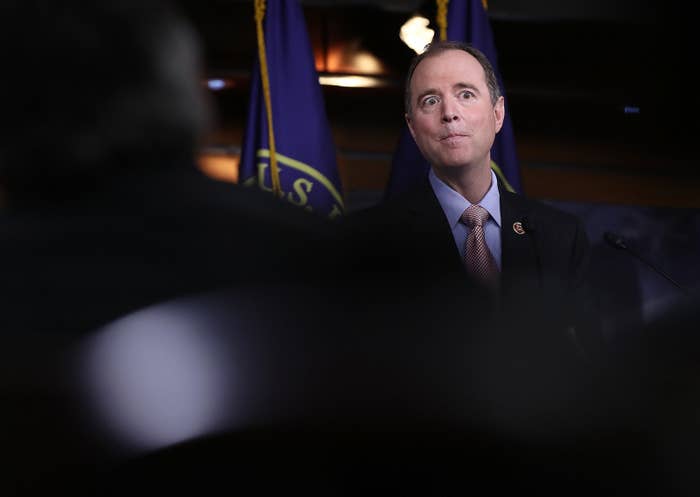
NEW YORK — At 5 p.m. Wednesday night, House Intelligence Committee Vice Chairman Adam Schiff went on camera to issue a blistering rebuke of his partner, House Intelligence Committee Chairman Devin Nunes, who had earlier that day publicly declared — without warning Schiff — that he had new information suggesting President Donald Trump’s transition team had been inappropriately surveilled by the Obama administration.
For those who partake in the often unexciting hobby of watching the intelligence committees, it’s hard to overstate the significance of that moment. One former staffer said they had never seen anything like it in their lifetime.
“My jaw has been on the floor all day,” one congressional aide familiar with the intelligence committees said.
It was an unprecedented breakdown in one of the Hill’s most sacred relationships, with high stakes — it quickly raised questions about the ability of a key congressional committee to impartially investigate the Trump campaign's possible ties to Russia. And the public was watching it deteriorate in real time.
The leadership of the Hill’s two intelligence committees — one senior Democrat and one senior Republican from the House, and the same arrangement in the Senate — is one of last remaining pillars of cooperation on Capitol Hill. The relationship is close, happens almost entirely behind closed doors, and involves cooperative access and oversight of some of the country’s most secret covert programs.

Nunes has put a fracture in that long-held tradition that may not be patchable.
As the Senate Intelligence Committee and the House Intelligence Committee each embark on their own, parallel investigations into Russia’s role in the 2016 election, there have been almost constant near-misses in upending the panels’ respective bipartisanship. Schiff and Nunes have been publicly butting heads over the committee’s probe almost since it was announced — with Nunes, who also helped lead the Trump transition team, a reliable voice for Trump’s interests. Schiff, meanwhile, has challenged his credibility to lead the probe, given his closeness to the Trump campaign and transition.
Meanwhile, the Senate Intelligence Committee leaders, Sens. Richard Burr and Mark Warner, had their own spat in February, when, at the behest of the White House, Burr called reporters and sought to tamp down stories on potential Trump-Russian connections. Warner was unsettled, and publicly said so. Some Republicans, in turn, were furious Warner talked. But while the incident threatened to upend the Senate’s investigation into Russia, Burr and Warner both kept from airing further grievances publicly and, a month later, seem to be back on good terms.
Within that context lies what was perhaps Nunes’ greatest transgression. The intelligence oversight committees have a uniquely secretive culture. Everything — legislation, bill proposals, reports, internal committee drama, even disputes — stays in-house. The strategy doesn’t often bode well for the public, but it’s indisputably a deeply ingrained culture unique to the committees.
“Instead of talking to the committee, he went to the press,” Mieke Eoyang, a former staffer on the House intelligence panel and currently a vice president at the bipartisan think tank Third Way, said of the Nunes incident. “That’s the whole point of the committee. There’s oversight, but we keep it in the family. He broke the ‘keep it in the family’ [rule].”
Nunes apologized to his fellow committee members on Thursday for circumventing them before going to the White House. It’s unclear how much credibility he can recover, or whether he can salvage the panel’s probe — Sen. John McCain said Wednesday night he “no longer” believes Congress has the “credibility” to investigate the Russia issue.
Nunes' office did not respond to a BuzzFeed News request for comment.
The Senate panel, meanwhile, has watched the decline of the House’s investigation from a distance — and all indications are they want to keep it that way. More than a day since Nunes’ unprecedented press conference, neither Burr nor Warner had issued public statements, and neither indicated they’re going to.
The House has consistently struggled to grant its own probe the same guise of professionalism and congeniality of the Senate’s, and whether its drama will impact the Senate side remains to be seen.
As one official put it earlier this month: “Gotta treat both sides the same, even if [it is] a House of Fools.”
